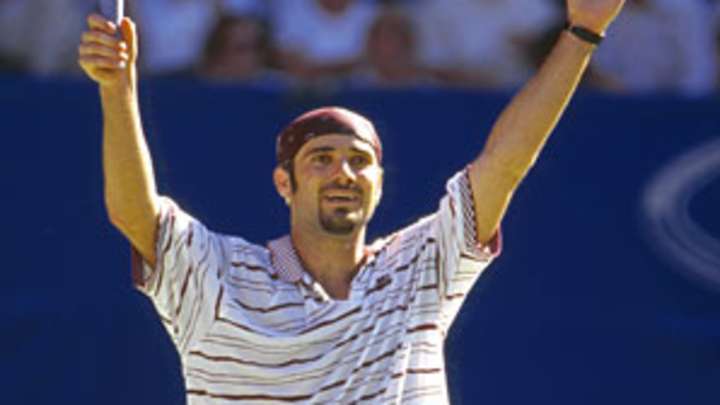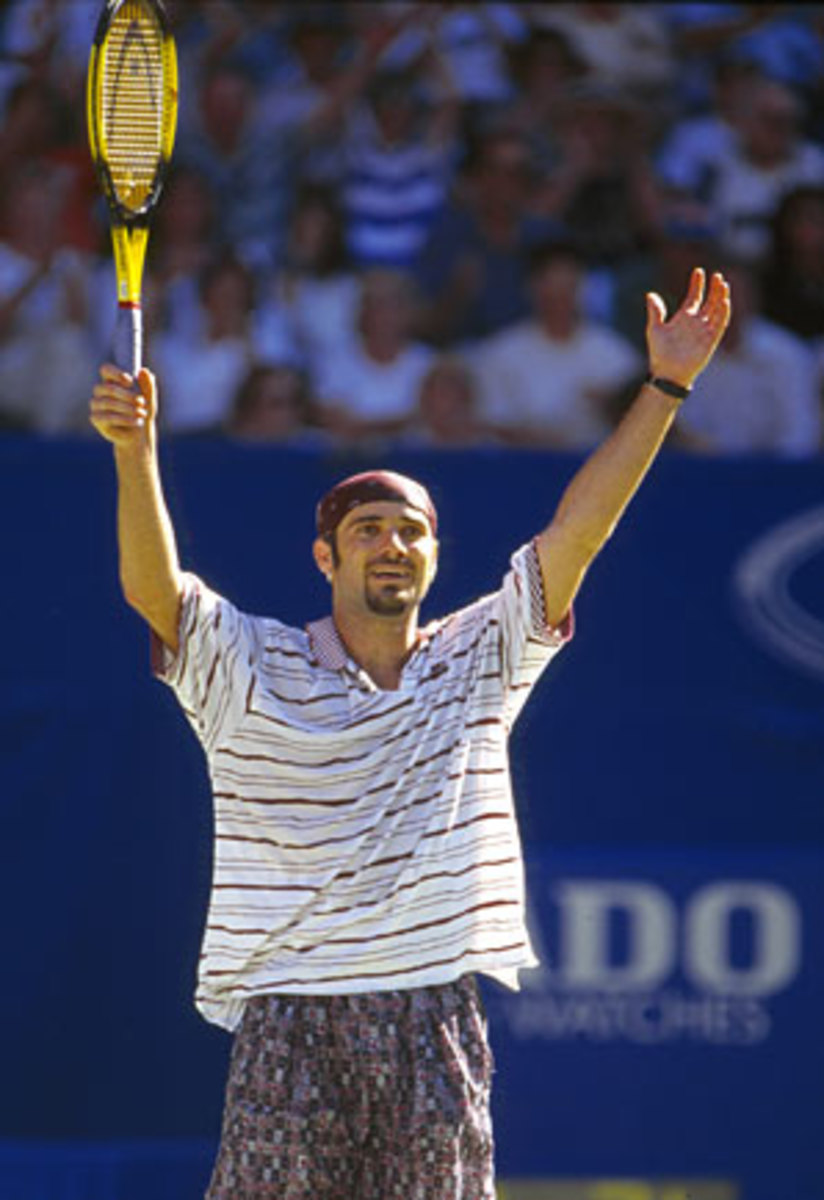Catching up with Andre Agassi


Andre Agassi captured his first Australian Open men's singles championship in 1995, repeating the feat in 2000, '01 and '03. (Bob Martin/SI)
As the last American man to win the Australian Open (in 2003), Andre Agassi knows what it takes to win in Melbourne. And it was no fluke: Agassi won the season-opening Grand Slam in four of the nine years he entered. An iconoclast turned icon, Agassi retired from pro tennis in 2006 as one of just five men to win each of the sport's four major tournaments, an elite class since joined by Roger Federer and Rafael Nadal. He's also the founder of the Andre Agassi Foundation for Education, which has raised more than $150 million for at-risk youth in Nevada. We caught up with Agassi, now 40, to talk about Australian Opens past and present, the state of American tennis in 2011 -- and a certain charity auction in Taiwan.
SI.com: The tennis Hall of Fame says it’s going to announce a Class of 2011 inductee Thursday and it’s making the introduction at Agassi Prep, your charter school in Las Vegas. Any guesses who it might be?
Andre Agassi: [laughs] I’m hoping they’re not coming all the way out here to make me feel bad. I certainly look forward to it being official, but also am grateful with that assumption that they’ve chosen my school. Tennis has given me many great things in my life and it’s also given me my life’s work. That’s it right there, along with a vision to take that across this country over the next five years.
SI.com: When did you find out?
Agassi: They called on Tuesday and inquired if there would be any obstacles in choosing to do it that way, choosing to come to make an announcement [on campus]. And obviously my arms are wide open when it comes to that: the quickest way to me is through those kids at my school. They made it official yesterday as it relates to announcing that they were coming for the decision.
SI.com: You won the Australian Open four of the nine times you entered. What was the secret of your success down there?
Agassi: First off, it was an environment that was well-suited for my game and the way I went about my game. It was always hot and it was always windy, and I was good heat player and I was a good wind player. I was good heat player because I typically -- it wouldn’t be that case these days -- but I typically controlled the point against most guys. If you can sort of have an advantage in every point as it relates to wear and tear, the more that you raise the elements, the more of an advantage you have, and that’s how I played the game. The wind never really disturbed me. It kind of enhanced my game because I was always thinking about different ways to play; when I was against the wind I could really flatten it out, and when I was with the wind I showed a lot of discipline to stay in control of the point just enough to make a guy work overtime.
Another component which is important, even these days, is how you treat the end of your season. The end of your season is a crucial component to the start of your season, and I was always putting in eight weeks of hard physical preparation before heading down there. I felt like I was always going into the Australian Open as if I was peaking, and I think a lot of guys felt either like they were still recovering or like they were now trying to get ready for the year.
SI.com: Is that something you learned over time, or did you catch on to that relatively early?
Agassi: I always looked at my offseason at that stage of my career as an opportunity. I think it was a luxury I had that maybe other guys didn’t. The majority of players sort of have to make all their obligations [because] there were fines and penalties involved. I was always willing to compromise on the ranking to be ready for Australia, so that was more about having a real healthy team around me, knowing how to help me prioritize.
SI.com: What are your thoughts on this year’s tournament so far?
Agassi: I haven’t actually studied the draw as it relates to who’s on a one-track collision course with the other, but I have watched matches and certainly have seen some of the more interesting ones. [Sam] Querrey losing in five was a fascinating match for me to watch. The guy he played just was hitting the lights out of the ball. Disappointing to see an American leave that early, especially with his capabilities. Watching a couple comebacks this go-round is always a thrill. It kind of gets your fire going to see anybody dig down when they're deep in a hole like [Mardy] Fish did in his first match, or [Gael] Monfils did, or even [Fernando] Verdasco as recently as yesterday. Watching Fed have a tough second-round match is always surprising and interesting, but as it relates to overall forecast, it’d take a lot of convincing for me to believe that Nadal isn’t the frontrunner.
SI.com: You recently said the Federer-Nadal rivalry is “more compelling” than the one you had with Pete. Why do you think that?
Agassi: For a couple reasons. I think, first of all, they're the two greatest players historically speaking and playing in the same generation. Their accomplishments are -- maybe Laver could compare, what he did was extraordinary on two surfaces -- but for these guys to win all of them? Plus for Nadal to play so long at No. 2 and just to be so relentless during those years when Fed was dominant and to believe that he could still be better than him -- and to prove it with his head-to-head record. To have the No. 1 best player of all time have a losing record against the No. 2 player of all time, and to have the No. 2 player heading into his prime. That Pete and I really never had. We were No. 1 and No. 2 in the world, but we hadn’t come anywhere near establishing what these two have established during their primes.
SI.com: Looking back, you played during a golden age in American tennis with four Grand Slam champions: Pete, yourself, Michael Chang and Jim Courier. Do you think we’ll ever see that level of American dominance, or does the globalization of the sport preclude it?
Agassi: I think being dominant is getting harder and harder for any country. You would think America would have the best chance given its size, but when you really look at the grassroots level, that’s where you see the future of the game. We're starting to get a bit more aggressive with how we introduce the game to more kids and sort of filter out the best talent. I think it is possible certainly, but the competitiveness of what we’re seeing these days is unparalleled. There's very little room for anybody. It's my belief that if Pete and I were playing now, they’d be asking the same question: What's wrong with American tennis? And the answer would always come back the same: Nadal and Federer. That’s what’s really wrong with American tennis. How many Slams would Andy have won if it wasn’t for Fed? He would have won another two U.S. Opens, three or four Wimbledons, who the hell knows? So it’s a tough time to be trying. It’s slim pickings out there for Grand Slams.
SI.com: Every time you’ve gotten behind the microphone to do commentary for tennis, it’s been very well-received. Have you ever considered going into broadcasting further?
Agassi: No, I’ve never really considered that just because of what’s required to do it well and to do it full time. The traveling. You have to stay connected to the game. There are certain things I understand about the game, but the longer the game goes, the more I don’t understand about it because the athlete gets better, the equipment changes, the string changes, the shot selection changes, the weaknesses get harder to recognize when you haven’t been out there on the other side of the net. I think everybody goes through a period of time after they’ve played where they are a really good to great commentator. Then, unless you're out there staying close to the game week after week, you inevitably lose touch. I think that would be the same with me if I'm not paying the price. And I would never do anything sort of halfway, I would have to fully commit to it.
SI.com: What’s the latest with Agassi Prep and the Andre Agassi Foundation for Education?
Agassi: I have a venture with Canyon Capital, which is a $20 billion investment company out of Southern California -- that I can’t speak very specifically about because of SEC regulations -- but we are focused on figuring out a way to scale the best-in-class charter schools throughout our country. Over the next five years, we have plans on expanding what I’m doing in Vegas considerably.
SI.com: What’s been the most gratifying part of the Agassi Prep experience?
Agassi: It's seeing kids that were told they can't accomplish what they want and watching them take ownership of their lives and giving them an opportunity to have a future of their choosing. That’s been the most gratifying part, to see two graduating classes where 100 percent of the kids have gone to university. And if it wasn’t for our school, who knows where they would be. That’s what you're always hit with: it's the reality that these kids, without this school, would virtually have no chance.
SI.com: Last question -- I have to ask -- everybody wants to know about the charity auction in Taiwan. Give us the inside dope. What really happened?
Agassi:
[
laughs
